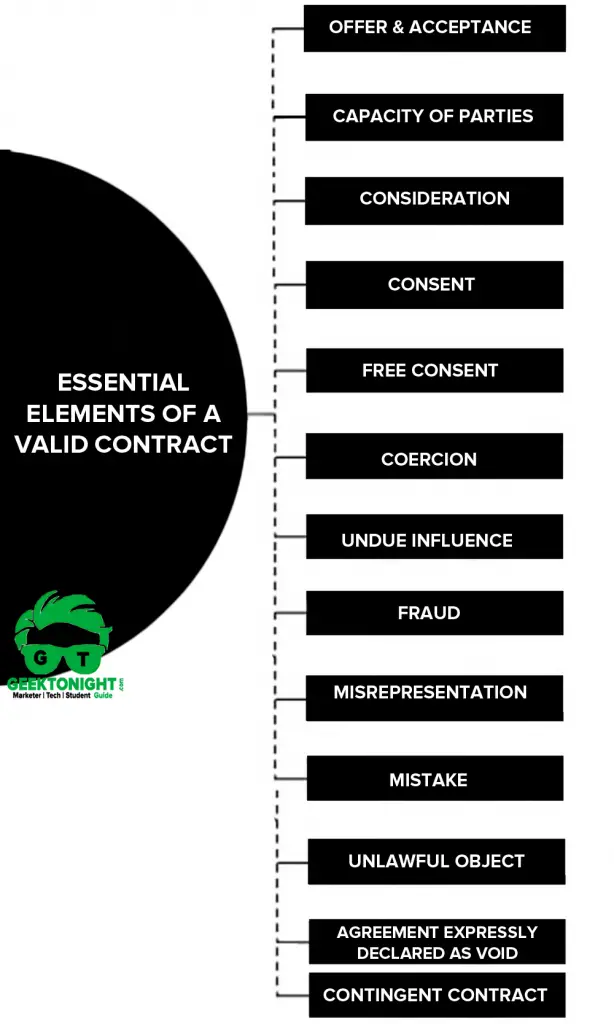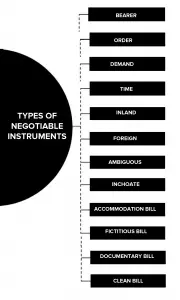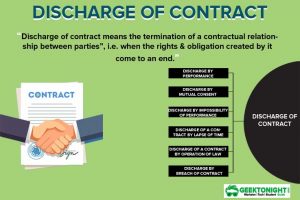Essential Elements of a Valid Contract
13 Essential Elements of a Valid Contract are discussed below:
- Offer and Acceptance
- Capacity of the parties
- Consideration
- Consent
- Free Consent
- Coercion
- Undue Influence
- Fraud
- Misrepresentation
- Mistake
- Unlawful Object
- Agreement Expressly Declared As Void
- Contingent Contract

Table of Content
Offer and Acceptance
First essential elements of a valid contract is that, there must be an offer and its acceptance.
Such offer and acceptance should create legal obligations between parties. This should result in a moral duty on the person who promises or offers to do something. Similarly, this should also give a right to the promise to claim its fulfilment.
Capacity of the parties
The second essential elements of a valid contract is the capacity of the parties to make a valid contract.
Capacity or incapacity of a person could be decided only after calculating various factors. Section 11 of the Indian Contract Act 1872 elaborates on the issue by providing that a person who:
Law prohibits
- Minors
- persons of unsound mind [excluding the lucid intervals]
- person who is otherwise disqualified like an alien enemy, insolvents, convicts etc from entering into any contract.
Consideration
Consideration is one of the essential elements of a valid contract.
Section 2(d) of the Indian Contract Act, 1872 defines ‘Consideration’ would generally mean ‘compensation’ for doing or omitting to do an act or deed.
It is also referred to as ‘quid pro quo’ viz ‘something in return for another thing’. Such a consideration should be a lawful consideration.
Consent
According to Section 13 of the Act, “Two or more persons are said to have consented when they agree upon the same thing in the same sense.” This is stated as identity of minds or “consensus-ad-idem”
Free Consent
Section 14 of the Act, states that “consent is said to be ‘free’ when it is not caused by:
- Coercion – Section 15
- Undue influence – Section 16
- Fraud – Section 17
- Misrepresentation – Section 18
- Mistake – Section 20, 21 and 22
Coercion
According to Section 15 of the Act, “Coercion” is the committing, or threatening to commit any act forbidden by the Indian Penal Code 1860, or the unlawful detaining or threatening to detain any property, to the prejudice of any person whatever, with the intention of causing any person to enter into an agreement.
Undue Influence
According to Section 16 of Act, “A contract is said to be induced by “undue influence” where the relations subsisting between the parties are such that one of the parties is in a position to dominate the will of the other and uses that position to obtain an unfair advantage of the other.”
The essential ingredients of undue influence are:
One of the parties dominates the will of the other and
- he has real or apparent authority over the other;
- he is in a position to dominate the will of the other
- the dominating party takes advantage of the relation
Fraud
According to Section 17 of the Act, “fraud means and includes any of the following acts committed by a party to a contract or with his connivance or by his agent with intent to deceive another party thereto or his agent or to induce him to enter into the contract.”
Misrepresentation
“Misrepresentation” does not involve deception but is only an assertion of something by a person which is not true, though he believes it to be true. Misrepresentation could arise because of innocence of the person making it or because he lacks sufficient or reasonable ground to make it.
Essential elements of misrepresentation
All elements of fraud are equally applicable to misrepresentation except the knowledge of false facts.
Following are the essential elements of a valid contract misrepresentation:
- The party makes a representation of facts which are false.
- The misrepresentation should be related to the material facts of contract.
- The misrepresentation should be with an intention that the other party should act upon it.
- The misrepresentation should have been acted upon.
- The misrepresentation was made innocently.
- Other party actually acted believing misrepresentation to be true.
Mistake
It means an erroneous belief about some facts.
A mistake can either be:
a. Mistake of law
b. Mistake of fact
Mistake of law
A mistake of law does not mean mistake in provisions of any law but it means there is mistake in understanding the provision of any law by the party to contract.
A mistake of law can be further classified either as mistake of Indian law and mistake of foreign law.
Mistake of fact
A mistake of fact can be classified either as a bilateral mistake or a unilateral mistake.
- Bilateral mistake: A bilateral mistake of fact occurs when both parties to the contract are operating under a mistaken reality. Bilateral mistakes are also known as mutual mistakes or common mistakes.
- Unilateral mistake: A mistake of fact is unilateral when only one party is mistaken. A mistake of fact that is unilateral in nature is not normally a reason to set aside a contract or a reason that will allow a plaintiff in a civil trial to seek damages.
A unilateral mistake of fact will result in an enforceable voidable contract.
Unlawful Object
In terms of section 23 of the Act ‘consideration’ or ‘object’ is unlawful if it is forbidden by law; or it would if permitted, defeat the provisions of any law or is fraudulent or involves injury to the person or property of another or is immoral or opposed to public policy.
Every agreement where the object or consideration is unlawful is void. Thus section 23 has set out the limits to contractual freedom.
Agreement Expressly Declared as Void
As we know, certain agreements are void ab initio under the Contract Act, like agreements by
- incompetent persons (Section 11)
- agreement with unlawful object or consideration (Section 23)
- agreement made under mutual mistake of fact (Section 20)
- agreement without consideration (Section 25)
- agreement in restraint of marriage, trade or legal proceedings etc., as they are opposed to public policy.
In addition to the above, there are also other agreements which are expressly declared as void.
Where consideration is unlawful in part
Section 24 of the Indian Contract Act, “If any part of a single consideration for one or more objects, or any one or any part of any one of several considerations for a single object is unlawful, the agreement is void”.
Agreement the meaning of which is uncertain (Sec 29)
Where the meaning of the terms of an agreement is uncertain or if it is not capable of being understood with certainty, then the agreement is void. But where the meaning is capable of being made certain, then the agreement is valid.
Wagering agreement
Wagering agreement is one which involves payment of a sum of money upon the determination of an uncertain event. Wager means gambling or betting.
Contingent Contract
The contingent contract is defined as the contract in which the promisor undertakes to perform the contract upon that happening or nonhappening of a specified future uncertain event, which is collateral to the contract.
Key Terms
- Offer: In contract law, an offer is a promise in exchange for performance by another party.
- Acceptance: An offer is an open call to anyone wishing to accept the promise of the offeror and generally, is used for products and services
- Consent: According to Section 13 of the Act, “Two or more persons are said to have consented when they agree upon the same thing in the same sense.”
- Free consent: Free consent is one of the essential elements of a valid contract. Parties to a contract may agree upon the same thing in the same sense, and along with the same; consent received must be free from any compulsion or pressure. Lack of free consent would render the contract voidable at the option of the party not at fault.
- Coercion: Contract coercion occurs when a contract agreement is entered into under conditions involving harm or threats of harm.
- Undue influence: Undue influence is an equitable doctrine that involves one person taking advantage of a position of power over another person. This inequity in power between the parties can vitiate one party’s consent as they are unable to freely exercise their independent will.
- Fraud: Contract fraud occurs when one party in a contract presents information to another that is incorrect, deceitful or meant to confuse the other party.
- Mistake: In contract law, a mistake is an erroneous belief, at contracting, that certain facts are true. It can be argued as a defence, and if raised successfully can lead to the agreement in question being found void ab initio or voidable, or alternatively an equitable remedy may be provided by the courts.
- Misrepresentation: A misrepresentation is a false statement of fact made by one party to another, which, whilst not being a term of the contract, induces the other party to enter the contract.
- Unlawful consideration: Unlawful consideration is any clause in a contract that is forbidden by law, would violate the law, is based on a fraud or creates an injury to another party. In the United States, this is known as an illegal agreement.
Business Law Notes
(Click on Topic to Read)
Business Law Book References
- Goel, P. K. (2006). “Business Law for Managers” Wiley
- Sheth, T. (2017). “Business Law” (2ed.) Pearson.
- Kuchhal. M.C. & Prakash. “Business Legislation for Management” (2ed.) Vikas Publishing.
FAQ
Business Law is also known as Commercial law or corporate law, is the body of law that applies to the rights, relations, and conduct of persons and businesses engaged in commerce, merchandising, trade, and sales.
The Indian Contract Act is divisible into two parts.
The first part (Section 1-75) deals with the general principles of the law of contract and therefore applies to all contracts irrespective of their nature.
The second part (Sections 124-238) deals with certain special kinds of contracts, namely contracts of Indemnity and Guarantee, Bailment, Pledge, and Agency.
It is the duty of the seller to deliver the goods and of the buyer to accept and pay for them, in accordance with the terms of the contract of sale.
– Sec. 31, The Sale of Goods Act, 1930
Sales of Goods Act 1930 came into force on 1st July 1930. It extends to the whole of India. It does not affect rights, interests, obligations and titles acquired before the commencement of the Act. The Act deals with the sale but not with mortgage or pledge of the goods.
The Sale of Goods Act, identifies the terms, “Conditions and Warranties” as being of a prime significance in a contract of sale.
Negotiable Instruments Act 1881
Negotiation of an instrument is the process by which the ownership of an instrument is transferred from one person to another.
The crossing of Cheque means that the specific cheque can only be deposited straightway into a bank account and cannot be instantly cashed by a bank or any credit institution.
Promissory Note, on the other hand, is a promise to pay a certain amount of money within a stipulated period of time. And the promissory note is issued by the debtor.
Bill of exchange is an instrument ordering the debtor to pay a certain amount within a stipulated period of time. Bill of exchange needs to be accepted in order to call it valid or applicable. And the bill of exchange is issued by the creditor.
A cheque is a bill of exchange, drawn on a specified banker and it includes ‘the electronic image of truncated cheque’ and ‘a cheque in electronic form’.
Go On, Share article with Friends
Did we miss something in Business Law Note? Come on! Tell us what you think about our article on 13 Essential Elements of a Valid Contract | Business Law in the comments section.
Business Law Notes
(Click on Topic to Read)
- What is Business Law?
- Indian Contract Act 1872
- Essential Elements of a Valid Contract
- Types of Contract
- What is Discharge of Contract?
- Performance of Contract
- Sales of Goods Act 1930
- Goods & Price: Contract of Sale
- Conditions and Warranties
- Doctrine of Caveat Emptor
- Transfer of Property
- Rights of Unpaid Seller
- Negotiable Instruments Act 1881
- Types of Negotiable Instruments
- Types of Endorsement
- What is Promissory Note?
- What is Cheque?
- What is Crossing of Cheque?
- What is Bill of Exchange?
- What is Offer?
- Limited Liability Partnership Act 2008
- Memorandum of Association
- Articles of Association
- What is Director?
- Trade Unions Act, 1926
- Industrial Disputes Act 1947
- Employee State Insurance Act 1948
- Payment of Wages Act 1936
- Payment of Bonus Act 1965
- Labour Law in India
Business Law Notes
(Click on Topic to Read)
- What is Business Law?
- Indian Contract Act 1872
- Essential Elements of a Valid Contract
- Types of Contract
- What is Discharge of Contract?
- Performance of Contract
- Sales of Goods Act 1930
- Goods & Price: Contract of Sale
- Conditions and Warranties
- Doctrine of Caveat Emptor
- Transfer of Property
- Rights of Unpaid Seller
- Negotiable Instruments Act 1881
- Types of Negotiable Instruments
- Types of Endorsement
- What is Promissory Note?
- What is Cheque?
- What is Crossing of Cheque?
- What is Bill of Exchange?
- What is Offer?
- Limited Liability Partnership Act 2008
- Memorandum of Association
- Articles of Association
- What is Director?
- Trade Unions Act, 1926
- Industrial Disputes Act 1947
- Employee State Insurance Act 1948
- Payment of Wages Act 1936
- Payment of Bonus Act 1965
- Labour Law in India






